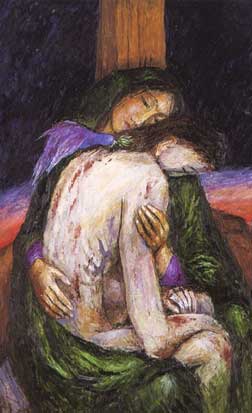 |
|
| The Assumption of Mary. |
|
| |
|
 |
The Assumption of Mary is celebrated on the 15th of August in mid summer. But what is the meaning of this word that cannot be found in the bible in which Mary is mentioned only in a few circumstances? The etymology of the word means: “ take with self”. Jesus, her son, recognized by the Christians as the Christ, sent by God, took Mary with him, in relation with the circumstances leading to his ascension into heaven, the day of the Ascension. Like Jesus, Mary is not any more depending on the historical conditions prevailing on earth. The catechism of the Roman Catholic Church says: ”The Assumption of the Holy Virgin is a specific part that is related to the Resurrection of her Son and anticipates the resurrection of the other Christians (966). |
|
|
| |
|
| It was Pius XII who gave the definition of the dogma of the Assumption of Mary in 1950. We could have thought that it was a recent doctrine. In reality the cult around Mary is linked with the origins of Christianity. Mary appears closer to us than God; she is a kind of a relay between divinity and humanity. On the other hand, the Christian religion has a patriarchal aspect like the civilisation where it started. Even if we know that God is not of a given sex, the words we use to speak about him: Father, Son, Holy Spirit…. and all the images of him are masculine. A feminine aspect was needed and it was Mary who became that aspect of God like a feminine smile. The Assumption is only the finale of Mary’s cult, well rooted in the Christian people practice, especially in France where Louis the XIII dedicated his kingdom to Mary and installed a celebration in her honour on August 15. The dogma has certified the popular devotion. This piety for Mary has been some time excessive transforming her into a true goddess. In reality we have idealized the woman and the mother. |
|
| |
|
| In our days, many women refuse the impossible model of Mary, virgin and mother. They don’t want to be only referenced by their sexual specificities. Mary is not the model of the Woman but the model for all believers, men or women, in the development of their faith. |
|
|
|
| |
|
| In the Gospel, the few texts that deal with her show another personality more appreciated today than in the last century. Mary is a free woman, who shows her confidence. With her free “yes” said to the angel announcing she will give birth to a son of an exceptional destiny (Luke 1, 20) but that she will suffer by him. The old man Symons predicted her that “a sword will pierce her heart” (Luke 2.35). |
|
| |
|
 |
Not only she suffered by the death of her son, to which, as John said, she attended but, already in his adolescent years he strayed away and Joseph and herself were so full of anguish, searched for him in all Jerusalem for three days (Luke 2, 41-51). In spite of Jesus’ rebuffs, she kept her confidence in him like for instance in Cana: “ What do you want of me, woman? My time has not yet come”. “All he will tell you to do, do it” (John 2, 4-5), she said anyway to the servants. |
|
|
| |
|
| The Magnificat canticle that she composed for her visit to Elizabeth is a song of freedom, even a revolutionary request: “ He overturns the powerful rulers from their thrones, He raises those who are humble. He fills with goods those who are starving, send back the rich with empty hands” (Luke 1, 46-54). The Manificat is a sign of the renewal of the world, the utopia of the Kingdom, already there but to which we are proposed to cooperate. Under the word Assumption we learn to discover the future of every man and every woman that Mary has inaugurated in following Jesus her son. The 15th of August becomes the celebration of hope. |
|
| |
|
|

